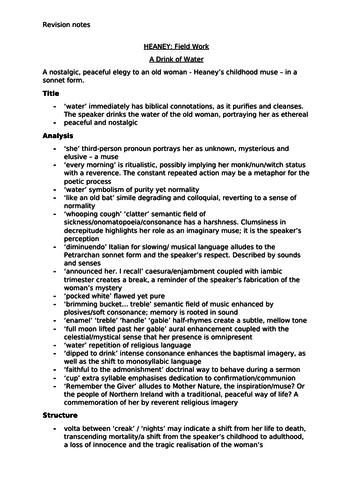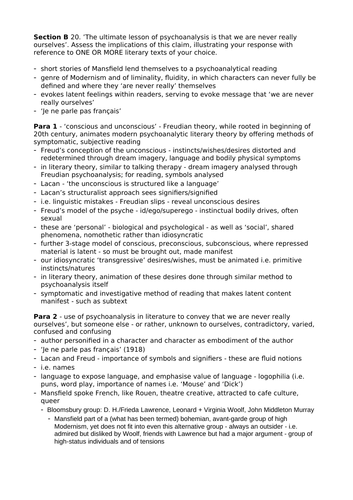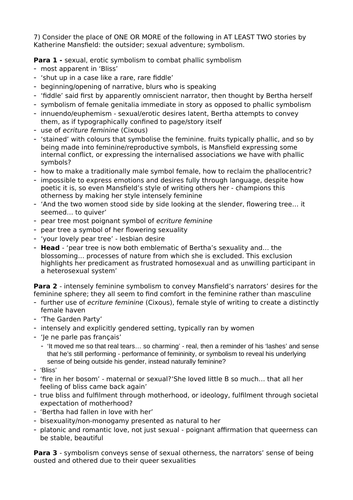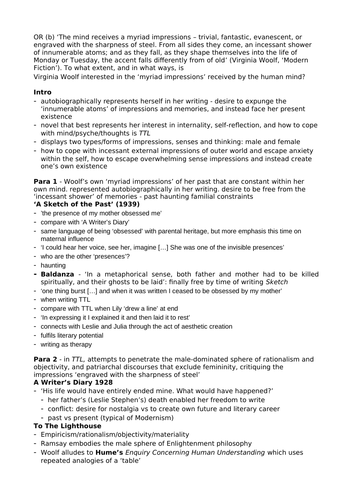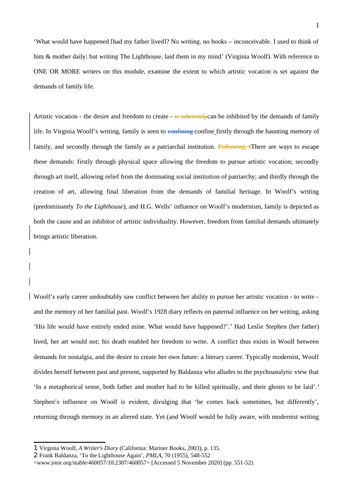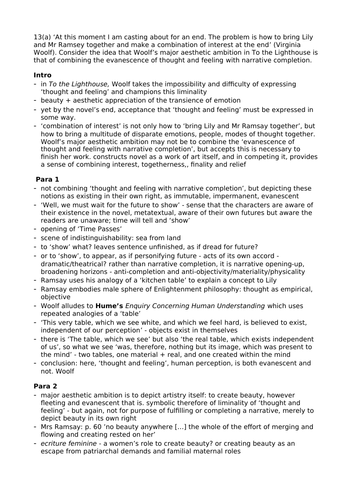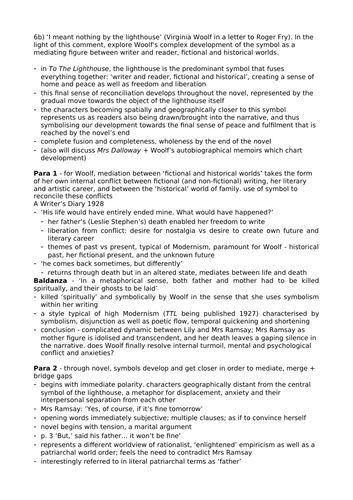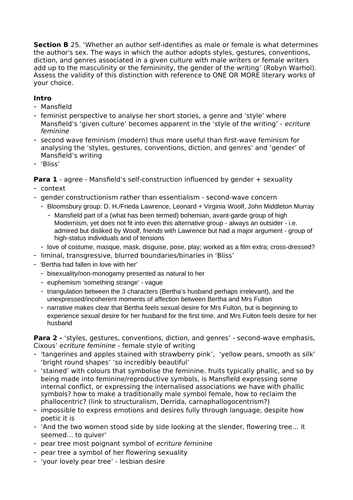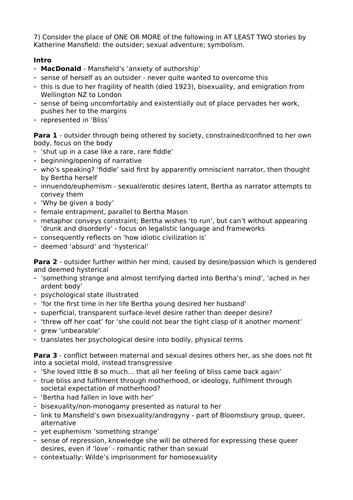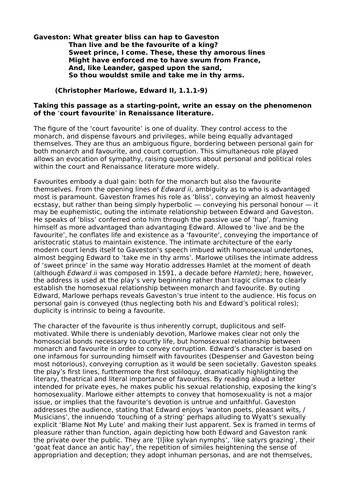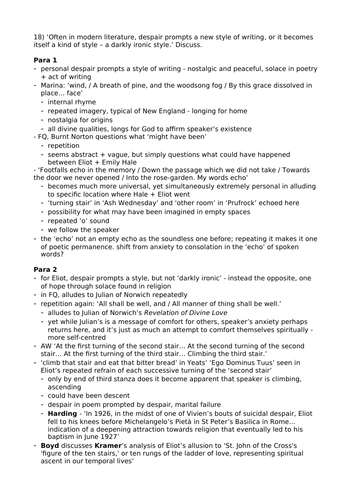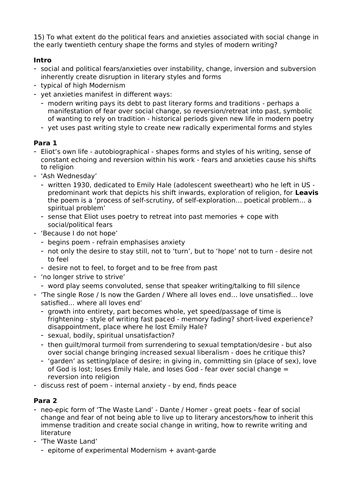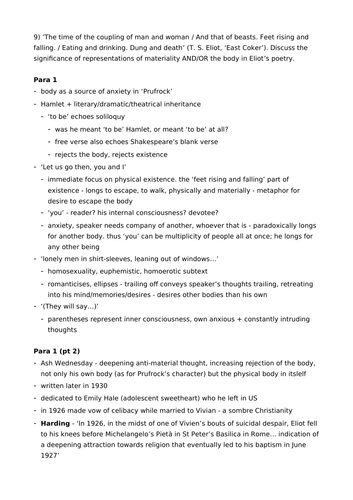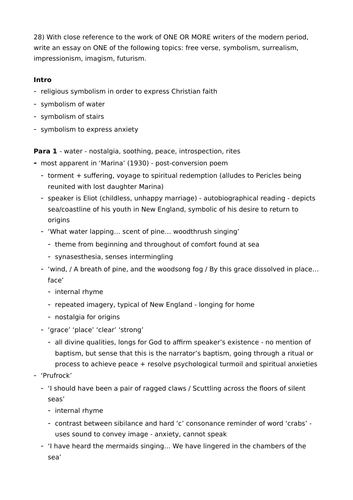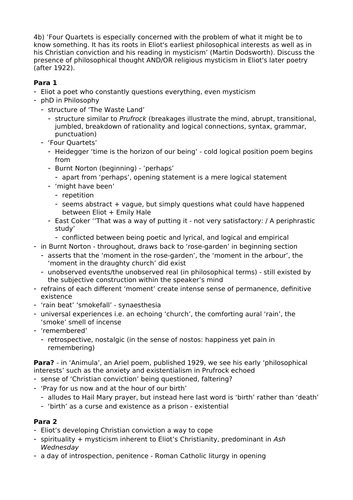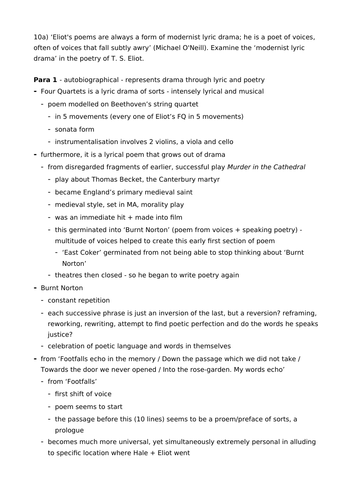
89Uploads
21k+Views
1k+Downloads
English language arts

A* Analysis of Seamus Heaney's Field Work
Concise but detailed 6-poem bundle.
Analysis by an A* student! including language and structure, literary terminology, context behind poems, alternative interpretations, critical quotations and themes/groupings of poems.
For WJEC Eduqas A-level English Literature but can be used for any exam board.
Includes: An Afterwards, A Drink of Water, The Strand at Lough Beg, A Postcard from North Antrim, A Dream of Jealousy, The Skunk.

Essay Plan: Katherine Mansfield and Psychoanalysis
This essay plan was written by a second-year undergraduate at Durham University.
It looks at the question: ’The ultimate lesson of psychoanalysis is that we are never really ourselves’. Assess the implications of this claim, illustrating your response with reference to ONE OR MORE literary texts of your choice.
This analyses Katherine Mansfield’s short story, 'Je ne parle pas français’, using Lacanian and Freudian 20th-century models of psychoanalysis, during the Modernist era.
Can be used for university as well as A-level students.

Essay Plan: Katherine Mansfield and Symbolism
This essay plan was written by a second-year undergraduate at Durham University.
It looks at the question: Consider the place of ONE OR MORE of the following in AT LEAST TWO stories by Katherine Mansfield: the outsider; sexual adventure; symbolism.
This analyses symbolism within Katherine Mansfield’s short stories, ‘Bliss’, ‘Je ne parle pas francais’, and ‘The Garden Party’. Feminine, sexual, and erotic symbolism, and Helene Cixous’ theory of ecriture feminine is looked at.
Can be used for university as well as A-level students.

Essay Plan: Impressions in Virginia Woolf's writing
This resource is a plan written by a second-year undergraduate at Durham University.
It looks at the question: ‘The mind receives a myriad impressions – trivial, fantastic, evanescent, or engraved with the sharpness of steel. From all sides they come, an incessant shower of innumerable atoms; and as they fall, as they shape themselves into the life of Monday or Tuesday, the accent falls differently from of old’ (Virginia Woolf, ‘Modern Fiction’). To what extent, and in what ways, is Virginia Woolf interested in the ‘myriad impressions’ received by the human mind?
This can be used as a starting point to research themes of objectivity, family life, femininity, and symbolism within Virginia Woolf’s various works.

Essay on Virginia Woolf - family life
This essay has been written by a second-year undergraduate student at Durham University and received a 2.1 / 1st classification.
It answers the question: ‘What would have happened [had my father lived]? No writing, no books – inconceivable. I used to think of him & mother daily; but writing The Lighthouse, laid them in my mind’ (Virginia Woolf). With reference to ONE OR MORE writers on this module, examine the extent to which artistic vocation is set against the demands of family life.
This uses Virginia Woolf’s autobiographical diary, ‘Sketch’, as well as her novels To the Lighthouse, and Mrs Dalloway.
Can be used by university students, as well as A-level and GCSE students. It contains context (AO3), critics and alternative interpretations (AO5), as well as the other assessment objectives. Also contains a MHRA referenced bibliography and footnotes.

Essay Plan: Feeling in Virginia Woolf's writing
This resource is a plan written by a second-year undergraduate at Durham University.
It looks at the question: ‘At this moment I am casting about for an end. The problem is how to bring Lily and Mr Ramsey together and make a combination of interest at the end’ (Virginia Woolf). Consider the idea that Woolf’s major aesthetic ambition in To the Lighthouse is that of combining the evanescence of thought and feeling with narrative completion.
This can be used as a starting point to research themes of artistry, objectivity, imagery and symbolism within Virginia Woolf’s various works.

Essay Plan: Virginia Woolf and Symbolism
This essay plan was created by a second-year English Literature undergraduate at Durham University.
It looks at the question: ‘I meant nothing by the lighthouse’ (Virginia Woolf in a letter to Roger Fry). In the light of this comment, explore Woolf’s complex development of the symbol as a mediating figure between writer and reader, fictional and historical worlds.
This analyses Woolf’s works, A Sketch of the Past, Mrs Dalloway, To the Lighthouse, and ‘A Writer’s Diary’.

Essay Plan: Gender in Katherine Mansfield's 'Bliss'
This essay plan was created by a second-year English Literature undergraduate at Durham University.
It looks at the question: ‘Whether an author self-identifies as male or female is what determines the author’s sex. The ways in which the author adopts styles, gestures, conventions, diction, and genres associated in a given culture with male writers or female writers add up to the masculinity or the femininity, the gender of the writing’ (Robyn Warhol). Assess the validity of this distinction with reference to ONE OR MORE literary works of your choice.
This analyses Mansfield’s place within the Bloomsbury Group, Helene Cixous’ theory of ecriture feminine, feminism, and the Modernist era, and her short story, ‘Bliss’.

Essay Plan: Katherine Mansfield and the Outsider
This essay plan was created by a second-year English Literature undergraduate at Durham University.
It looks at the question: Consider the place of ONE OR MORE of the following in AT LEAST TWO stories by Katherine Mansfield: the outsider; sexual adventure; symbolism.
This analyses the idea of the outsider in Mansfield’s short story, ‘Bliss’, and themes and symbolism of gender, femininity, and the body and psyche.

Essay: the Court Favourite in Marlowe's 'Edward II'
This essay was written by a second-year undergraduate at Durham University. It answers the question:
Gaveston: What greater bliss can hap to Gaveston
Than live and be the favourite of a king?
Sweet prince, I come. These, these thy amorous lines
Might have enforced me to have swum from France,
And, like Leander, gasped upon the sand,
So thou wouldst smile and take me in thy arms.
(Christopher Marlowe, Edward II, 1.1.1-9)
Taking this passage as a starting-point, write an essay on the phenomenon of the ‘court favourite’ in Renaissance literature.
It looks at the ‘court favourite’ figure in Marlowe’s play, Edward II, as well as other contemporary Renaissance literature, mythology, religion, and homosocial bonds within the early modern court.
Can be used for university and A-level examples.
Bundle

Bundle: The Duchess of Malfi Essay Plans
6 in-depth university-level essay plans on John Webster’s The Duchess of Malfi.
1 A* A-level essay comparing A Streetcar Named Desire (Williams) and The Duchess of Malfi on gendered power struggles.
Essay plan themes: autonomy; Catholicism; freedom; the Malcontent; transgression; audience identification.
Written by a Durham University English Literature BA graduate and A* student.
Ideal resource for A-level and university students.

Essay plan: T.S. Eliot & Despair
This essay was written by a second-year undergraduate at Durham University. It answers the question:
'Often in modern literature, despair prompts a new style of writing, or it becomes itself a kind of style – a darkly ironic style.’ Discuss.
It looks at the influence of despair on T.S. Eliot’s writing style in poems such as ‘Marina’ and ‘Four Quartets’, the role of religion, and introspection in poems such as ‘The Love Song of J. Alfred Prufrock’ and ‘Ash Wednesday’.
Can be used for university and A-level examples.

Essay Plan: T.S. Eliot & Social Change
This essay plan was written by a second-year undergraduate student at Durham University.
It answers the question: ‘To what extent do the political fears and anxieties associated with social change in the early twentieth century shape the forms and styles of modern writing?’
The plan considers T.S. Eliot’s personal life in shaping his writing in poems like ‘Ash Wednesday’. It also considers the poetic form of ‘The Waste Land’ in the context of post world war anxieties and Modernism. It also addresses poems such as ‘Four Quartets’ , ‘Ash Wednesday’, and ‘The Love Song of J. Alfred Prufrock’.

Essay Plan: T.S. Eliot & the Body
This essay plan has been written by a second-year undergraduate at Durham University.
It addresses the question: ’The time of the coupling of man and woman / And that of beasts. Feet rising and falling. / Eating and drinking. Dung and death’ (T. S. Eliot, ‘East Coker’). Discuss the significance of representations of materiality AND/OR the body in Eliot’s poetry.
This looks at the body as a source of anxiety in ‘The Love Song of J. Alfred Prufrock’, his anti-materialism instilled in ‘Ash Wednesday’, spirituality in ‘Four Quartets’, and Eliot’s own personal spiritual beliefs in the context of his poetry.

Essay Plan: T.S. Eliot & Symbolism
This essay plan has been written by a second-year undergraduate at Durham University.
It addresses the question: With close reference to the work of ONE OR MORE writers of the modern period, write an essay on ONE of the following topics: free verse, symbolism, surrealism, impressionism, imagism, futurism.
It looks at the various symbols within his poetry such as water, particularly in ‘Marina’, ‘Prufrock’ and ‘Ash Wednesday’. It also analyses the symbol of the stairs in ‘Ash Wednesday’ and how this affirms his personal Christian faith, as well as introspection and personal exploration in the poem ‘Four Quartets’.

Essay Plan: T.S. Eliot & Mysticism
This essay plan was created by a second-year English Literature undergraduate at Durham University.
It looks at the question: ’Four Quartets is especially concerned with the problem of what it might be to know something. It has its roots in Eliot’s earliest philosophical interests as well as in his Christian conviction and his reading in mysticism’ (Martin Dodsworth). Discuss the presence of philosophical thought AND/OR religious mysticism in Eliot’s later poetry (after 1922).
This analyses Eliot’s own Christian beliefs, the mysticism within his writing, and anxiety within his poems. Poems discussed are ‘Animula’ (from the Ariel collection), Marina, Ash Wednesday, Four Quartets, with mention of The Waste Land and Prufrock.

Essay Plan: T.S. Eliot & Voice
This essay plan was written by a second-year undergraduate at Durham University.
It addresses the question: ‘Eliot’s poems are always a form of modernist lyric drama; he is a poet of voices, often of voices that fall subtly awry’ (Michael O’Neill). Examine the ‘modernist lyric drama’ in the poetry of T. S. Eliot.
The plan analyses the form of ‘Four Quartets’, as well as symbols in ‘Ash Wednesday’ and ‘Prufrock’. Anxious voices in ‘Prufrock’ are further analysed, as is the modernist lyric drama in ‘The Waste Land’ and the role of drama and dramatists in his poetry.
Bundle

Essay Plan bundle: Virginia Woolf
3 in-depth university-level essay plans, and 1 essay on Virginia Woolf.
Essay plan themes: feeling; impressions and senses; symbolism.
Essay theme: family life.
Includes discussions and analyses of multiple works such as Sketch, To the Lighthouse, Mrs Dalloway, and A Room of One’s Own. The essay is fully referenced with a MHRA bibliography.
Written by a Durham University English Literature BA graduate. Ideal resource for A-level and university students.
Bundle

Essay Plan Bundle: T.S. Eliot
6 in-depth university-level essay plans on T.S. Eliot’s poetry in response to 6 exam questions.
Essay plan themes: despair, mysticism and spirituality, social change, symbolism, the body and materiality, and voice.
Discusses poems such as Ash Wednesday, The Love Song of J. Alfred Prufrock, Marina, The Waste Land, and Four Quartets.
Written by a Durham University English Literature BA graduate. Ideal resource for A-level and university students.
Bundle

Essay Plan Bundle: Katherine Mansfield
4 in-depth university-level essay plans on Katherine Mansfield’s short stories.
Essay plan themes: gender, psychoanalysis, symbolism, the outsider.
Discusses stories such as The Garden Party, Bliss, Je ne parle pas Francais, and Mansfield’s own autobiographical context.
Written by a Durham University English Literature BA graduate. Ideal resource for A-level and university students.

